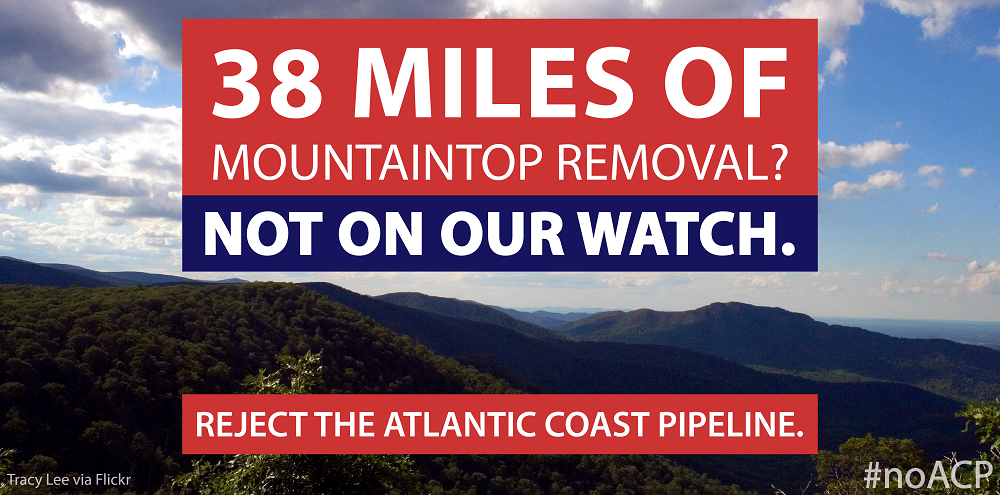New research exposes how Dominion’s proposed Atlantic Coast Pipeline would decapitate 38 miles of ridgelines in Virginia and West Virginia. Evidence will show project is OPPOSITE of “environmentally friendly” and states must reject it
RICHMOND, VA — A briefing paper released today details how Dominion Resources intends to blast away, excavate, and partially remove entire mountaintops along 38 miles of Appalachian ridgelines as part of the construction of the Atlantic Coast Pipeline. Engineering and policy experts have examined documents submitted by Dominion to the Federal Energy Regulatory Commission (FERC) and, using GIS mapping software, found that Dominion would require mountaintops to be “reduced” by 10 to 60 feet along the proposed route of the pipeline. For perspective, the height equivalent of a five-story building would be erased in places from fully forested and ancient mountains.
Furthermore, Dominion has yet to reveal how it intends to dispose of at least 247,000 dump-truck-loads of excess rock and soil—known as “overburden”—that would accumulate from the construction along just these 38 miles of ridgetops.
“In light of the discovery that the Atlantic Coast Pipeline will cause 10 to 60 feet of mountaintops to be removed from 38 miles of Appalachian ridges, there is nothing left to debate,” said Mike Tidwell, Executive Director of the Chesapeake Climate Action Network. “Dominion’s pipeline will cause irrevocable harm to the region’s environmental resources. With Clean Water Act certifications pending in both Virginia and West Virginia, we call on Virginia Governor Terry McAuliffe and West Virginia Governor Jim Justice to reject this destructive pipeline.”
Dominion has submitted a proposal to FERC to build a 42-inch diameter pipeline that would transport natural gas from West Virginia into Virginia and North Carolina. Dominion has attempted to paint the Atlantic Coast Pipeline as an “environmentally-friendly” project. However, its proposed construction method and route selection across and along steep mountains is unprecedented for the region—if not the country—and is viewed as extreme and radical by landowners, conservationists, and engineers. Similar impacts – although not yet fully inventoried – could come from the construction of a second pipeline to the south: the Mountain Valley Pipeline led by the company EQT Midstream Partners, LP.
“The Atlantic Coast Pipeline could easily prove itself deadly,” said Joyce Burton, Board Member of Friends of Nelson. “Many of the slopes along the right of way are significantly steeper than a black diamond ski slope. Both FERC and Dominion concede that constructing pipelines on these steep slopes can increase the potential for landslides, yet they still have not demonstrated how they propose to protect us from this risk. With all of this, it is clear that this pipeline is a recipe for disaster.”
The briefing paper released today was prepared by the Chesapeake Climate Action Network in coordination with the Allegheny-Blue Ridge Alliance, Friends of Nelson, Appalachian Mountain Advocates, and the Dominion Pipeline Monitoring Coalition. It cites data from the Draft Environmental Impact Statement prepared by the Federal Energy Regulatory Council (FERC) as well as information supplied to FERC by Dominion. It also compiles information from GIS (Geographic Information System) mapping software and independent reports prepared by engineers and soil scientists.
Key findings include:
- Approximately 38 miles of mountains in West Virginia and Virginia will see 10 feet or more of their ridgetops removed in order to build the Atlantic Coast Pipeline.
- This figure includes 19 miles in West Virginia and 19 miles in Virginia.
- The majority of these mountains would be flattened by 10 to 20 feet, with some places along the route requiring the removal of 60 feet or more of ridgetop.
- Building the ACP on top of these mountains will result in a tremendous quantity of excess material, known to those familiar with mountaintop removal as “overburden.”
- Dominion would likely need to dispose of 2.47 million cubic yards of overburden, from just these 38 miles alone.
- Standard-size, fully loaded dump trucks would need to take at least 247,000 trips to haul this material away from the construction site.
“It is astounding that FERC has not required Dominion to produce a plan for dealing with the millions of cubic yards of excess spoil that will result from cutting down miles of ridgetop for the pipeline,” said Ben Luckett, Staff Attorney at Appalachian Mountain Advocates. “We know from experience with mountaintop removal coal mining that the disposal of this material has devastating impacts on the headwater streams that are the lifeblood our rivers and lakes. FERC and Dominion’s complete failure to address this issue creates a significant risk that the excess material will ultimately end up in our waterways, smothering aquatic life and otherwise degrading water quality. Without an in-depth analysis of exactly how much spoil will be created and how it can be safely disposed of, the states cannot possibly certify that this pipeline project will comply with the Clean Water Act.”
“Even with Dominion’s refusal to provide the public with adequate information, the situation is clear: The proposed construction plan will have massive impacts to scenic vistas, terrestrial and aquatic habitats, and potentially to worker and resident safety,” said Dan Shaffer, Spatial Analyst with the Dominion Pipeline Monitoring Coalition. “There is no way around it. It’s a bad route, a bad plan, and should never have been seriously considered.”
The full briefing paper is available here.
CONTACT:
Denise, 240-396-2022, denise@chesapeakeclimate.org
Anne Havemann, 240-396-1984, anne@chesapeakeclimate.org
Briefing-Paper-Mountaintop-Removal-to-Build-ACP




